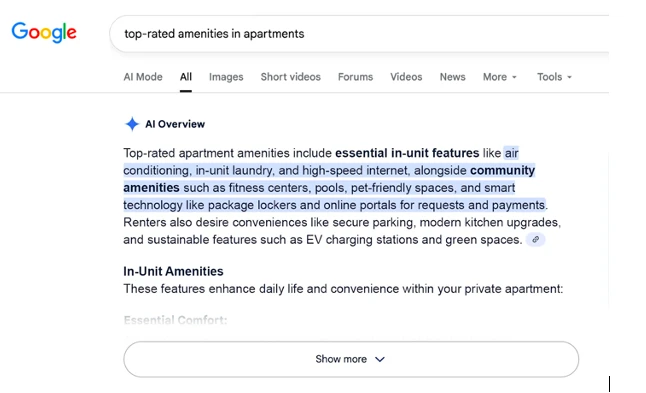
Move over, SEO. Answer Engine Optimization is what property managers need now
This is the first of a two-part series exploring how property managers can use new Answer Engine Optimization methods to get ahead of the curve—and their competitors—to come out on top in AI-driven search results.
We at DRai recently updated our public-facing website to better describe our case analysis tool and easy-to-use dispute resolution platform. In doing so, we learned a lot of simple methods for improving a website’s visibility to the new answer engines that are crawling the internet.
Here’s a simple, step-by-step guide with our best tips:
SEO still matters, but you need Answer Engine Optimization to win
You might have spent considerable time and money getting your website to appear at the top of Google or Bing search engine results using a process called Search Engine Optimization, or SEO. The hope, of course, is that the person who searched will click the link to your website. Recently, though, you might have noticed that above those hard-won search results, you see an AI-generated overview called a “featured snippet.”
Because the overview sometimes provides all the information the user is seeking, she might never click on any of the search results that appear below it. All is not lost, though: using a new technique called Answer Engine Optimization (AEO) can make it more likely that the answer engine will draw from your website to write its overview to relevant questions. Answer engines also power the results delivered by voice assistants such as Siri and Alexa and by some chatbots.
See the small blue “link” icon at the end of the first paragraph of the AI Overview below? That’s a link to one of the websites that the AI drew content from to write the overview.
Getting information from your website into the AI overview and getting a link to your website to appear in it are the goals of answer engine optimization.

“AI overview” or “featured snippet” generated by an answer engine
How to position your website to support AEO
Some of the techniques that will help your website be visible and of interest to answer engines overlap with those that support good SEO. So you might be part of the way there already!
Easily research what questions people are asking about your property or ones like yours
Part of answer engine optimization is understanding “user intent,” or the questions people want answers to about your apartments or properties like yours. AlsoAsked and AnswerThePublic can uncover those questions in only a few seconds. Each website offers three free searches each day.
You might start by searching the name of your property. In addition, AlsoAsked will let you specify which city searches should come from, which can make your results more accurate if your property has a common or ambiguous name. Also make sure that the country on each platform is set to the U.S.
On each website, what will display are the questions people are asking about your property. You also can use the tools to dig deeper on any of the questions that display and to use keywords that you know people use when searching for properties like yours. For instance, you might search “Milwaukee apartments with elevators” or “New Orleans apartment with a courtyard.”
You’ll use the questions you learn about in the next step of answer engine optimization.
To get AI’s attention, speak like a human on your website
AlsoAsked and AnswerThePublic provided you with lists of questions people actually asked about your property on popular search engines like Bing or Google. The way those questions are phrased is called “natural language.” You can add some of the questions or phrases to your website’s descriptions of your units, the grounds and amenities, and the surrounding community.
For instance, if you saw questions like “How well is [Property Name] kept up?,” you can pick up the term “upkeep” or the whole question then address maintenance, landscaping and the like on your website using the everyday language we all use.
Likewise, if you see questions such as “What are Denver apartments with high satisfaction scores?,” you can pick up the phrase “high satisfaction scores” and use it in a Q&A to provide data about your own fantastic ratings.
Using conversational phrases your prospects would realistically use increases the likelihood that your answers will be chosen by answer engines for AI overviews and for answers given by voice assistants or chatbots.
Create Q&A or FAQs sections
Publishing a list of clear questions and short, to-the-point answers on your website can help you get the attention of answer engines, and it’s useful to prospects, too.
In addition to the questions you discovered with the user intent tools, you already know a long list of questions that callers and people touring your property ask. This is a great place to start, and you can add even more specific questions to the list.
For example, if you often get the question “Can I have a pet?,” consider adding questions like these:
- How many pets do you allow?
- Is there a weight limit?
- Do you have a dog park?
- Can I bring my snake?
If you have a gym, you might add questions that touch on the facility’s equipment, safety, or access:
- How many machines do you have, and what types?
- How often is your equipment serviced?
- Do you have security cameras in the gym?
- Will I be able to bring a friend when I work out?
- Is the gym open 24/7?
Answers to each question should be short, no more than 40 to 60 words.
Use complete sentences, even if a Yes or No would answer the question. For example, write “No, you can’t bring your snake or other reptile, but all of your furry and feathered friends are welcome! We’d love to meet your bunny, bird, hamster, gerbil, cat, or dog.”
Encourage backlinks from the press and social media
Answer engines love to see live links to your website from credible sites. If you are featured in a news article, blog post, or podcast, often the news outlet will include such a link when mentioning your property. These are called backlinks. If you visit our site, you might see a backlink from this article!
Social media mentions that provide direct links can be useful as well.
Links from online rental marketplaces such as Apartments.com and Rent.com are not directly helpful in boosting your visibility to answer engines, but they do help SEO by telling search engines that your website is authentic. That credibility, in turn, is required for good AEO.
Provide updated, trustworthy content
When your website content is well-sourced and up-to-date, it signals to answer engines that it is credible, increasing its chances of being included in answer engine overviews.
You’ll get bonus points with answer engines if you can include articles written by experts; statistics or information from government sites; or best practices or other information from well-established industry sites such as AAOA. Be sure to credit and link to all outside resources.
Format for success
Answer engines respond well to short blocks of information formatted with bullet points and lists. (This also reflects the way visitors scan websites.)
You can easily implement this recommendation by dividing any long paragraphs on your current website and putting some information into bulleted lists. When it’s time to update your site, write new information in that way.
How to adapt content for other marketing and PR initiatives
The same methods you use to optimize your website for answer engines can work with other online marketing materials as well. For example, when you add natural language questions and clear, fact-based answers to your social media posts and digital ads, the Q&As can add to your business’ credibility with answer engines.
You might be surprised to learn that AEO is also transforming the format of news releases, which have followed a proven format for decades. However, adding a natural language Q&A format just after an introductory paragraph that describes your main “news” can boost your credibility with answer engines. You should also include bulleted lists when relevant.
If you have especially momentous news and are using a paid wire distribution service such as Business Wire or PR Newswire® to get the word out, you can follow the service’s instructions about adding meta tags (words or phrases helpful in helping answer engines find your news release).
Since paid news releases stay on the wire service’s website—and because the services’ sites are themselves highly credible—the link that you provide in the news release to your own website will help with your EAO score.
For best results, start now
Over time, these strategies can make it more likely that your answers will appear in answer engines’ featured snippets, along with a link to your website. And because these strategies are new, you’ll be ahead of your competitors if you start now.
David Lazzara, CEO
The DRai Solutions platform allows landlords and property managers to quickly resolve tenant and vendor disputes in a cost-effective, secure portal that reduces friction to preserve business relationships. Through AI-powered case law references, documented digital records, and a convenient negotiating portal, DRai offers alternative dispute resolution directly to property managers without the high upfront costs associated with formal mediation or arbitration.
David, a reason that I specified that AAOA should publish and host the sponsored articles is so that you can benefit from backlinks.
It would be good to add a News section under your About section to capture the headline, a blurb and a link to AAOA and other articles. The News section also can host news releases and blurbs about other company news.













 Accessibility
Accessibility